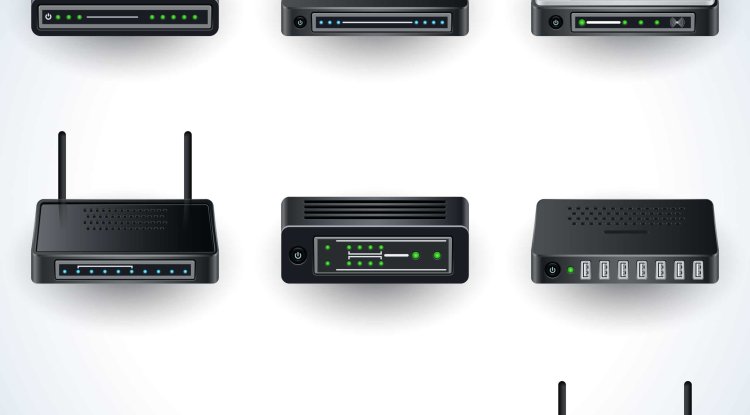Modem or router - what's the difference?

Modem and router are words you’ve probably heard countless times. The line between this two is sometimes difficult to distinguish, which confuses many. In the rest of this article, we’ll talk about the differences between a modem and a router, which may open your eyes better as a user about what’s better. What is a modem?
A modem is a device that allows you to connect to the Internet. There are different types of modems, depending on your internet connection. For example, it can be ADSL, cable and optical modems... While they all work a little differently, you don’t have to worry about it. All you need to know is the type of internet service you have to choose the right modem. If you pay for your own Internet service, you probably already have a modem in your home, which is usually supplied by your local Internet Service Provider (ISP). They have a connection to your ISP and a connection to your Internet connection devices. Some modems, such as those provided by some ISPs, also have built-in routers. What are routers?
The router sends internet traffic to various devices in your home. They allow you to use a modem, sold to you by your ISP, and connect it to computers and various other devices. Most routers these days also allow you to set up wireless networks.
The router will have an Ethernet or wired port for your modem and multiple Ethernet ports for desktops or other devices that use a wired connection. If it is a wireless router, it will also allow you to set up a wireless network in your home. This allows you to be online on your laptop, tablet or other devices.
There are different wireless network standards such as 802.11ac, 802.11n, 802.11g. 802.11ac is currently a popular format, but new wireless standards usually come out every few years with better range or higher speeds.
A wireless router has a limited range when it comes to connections, so if you live in a large home, you may have some areas that don’t have a good connection. Mesh routers solve this problem by installing multiple devices that share a connection throughout your home, allowing you to always be within range of one.
Home routers these days will often include more security features, such as firewalls to protect devices on your network. Modem and router
Both devices look pretty similar: a device with flashing lights on the front and a few cables coming out the back. How do you differentiate them? Most routers will also have wireless antennas, while a standalone modem will never have antennas.
The modem will also have fewer cable connections: one for the ISP and one for your computer or router. A router, on the other hand, usually has one port for connecting to a modem and then four or more for devices in your home.
All you need to connect to the internet is a modem - technically, anyway. One device at a time can be connected to a modem, but you can plug a router into the modem, then multiple devices can use that modem. Don’t forget about the additional security features of the router.
The standalone modem does not broadcast wirelessly. You will need a router if you plan to connect wirelessly. You need a router for wireless connectivity. Devices that combine a modem and a router into one (“two in one”)
A modem that also includes a built-in router sounds like a great idea, and sometimes it is, but not every time. While it’s convenient to have two devices in one piece of hardware, this can be limiting.
Most of the time, when you come across a 2-in-1 modem / router combination, you will get it from your ISP or ISP. They are designed to work for almost every client the ISP serves, but this often means that neither the modem nor the router is particularly good.
“2-in-1” is the best option if you want to buy a separate router and modem. In this case, since you are buying it for your own needs, you can make sure that both the side of the modem and the router device have the features and functionality you need. Which device is better to buy, a modem or a router?
If you are looking for higher internet speeds, you may be tempted to upgrade your modem, router or both. What would be the most beneficial of this? Do you need to upgrade at all?
Cases when it is better to buy a modem:
- Your ISP allows you to upgrade your modem.
- Your existing modem has a built-in router outdated or below standard.
- Looking for a more flexible network setup.
- You want a standalone modem without an integrated router.
Cases when it is better to get a router:
- You want to connect more devices to your modem.
- You want to transfer data between devices in your home.
- You have devices with more modern Wi-Fi technologies than your existing router can handle.
- You want to upgrade the security of your home network.
Can a new home modem increase internet speed?
There is a possibility for that. What ultimately determines your internet speed is your ISP. If your current modem can reach the maximum speed you pay for, a newer modem won’t change that. If you have a limited older modem, switching to a new one can enable higher internet speeds. If you’ve recently upgraded to a higher-level Internet plan and don’t see higher speeds, upgrading your modem can help. Can the new modem increase the speed of Wi-Fi connectivity?
Unless your modem has a built-in Wi-Fi router, n can. Wi-Fi speeds are usually reduced before the internet speed does. You can check this by visiting a website such as speedtest.net when your device is connected to Ethernet or a wired internet connection. Can the new router speed up Wi-Fi connectivity?
In some cases it can. If you have a new tablet, but your router does not support the latest Wi-Fi technologies, for example, your tablet will get stuck at the speed of older Wi-Fi technology. Upgrading your router will allow your device to use faster and new technology. Which is more “important”, a modem or a router?
For things like security, internet speed and ease of use, your router is more important than a modem. Your modem connects to the Internet, but the router establishes all the connections that are important to your devices.





































